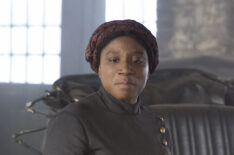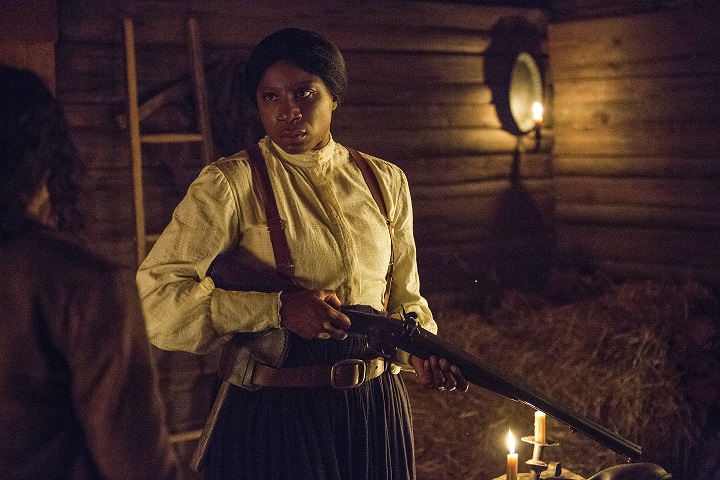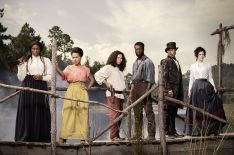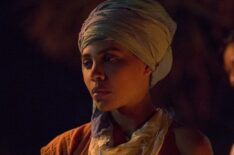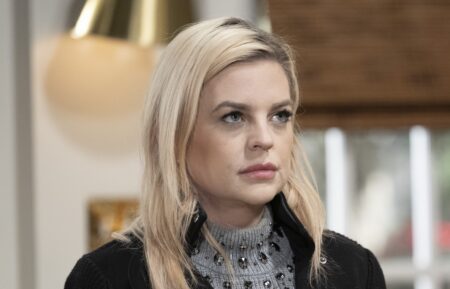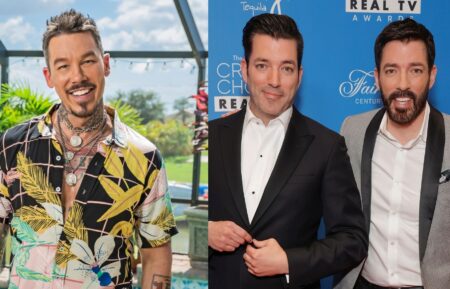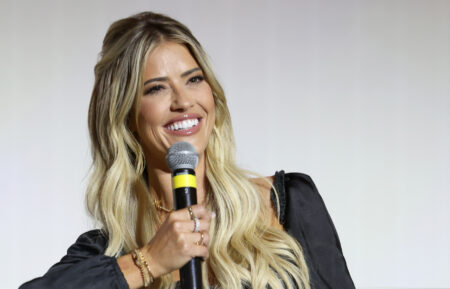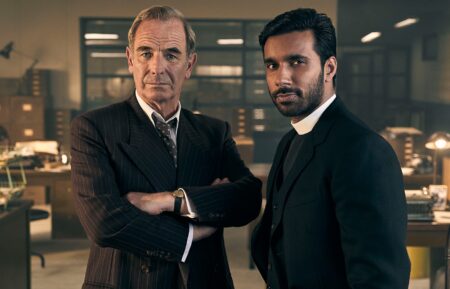‘Underground’ Star Aisha Hinds Breaks Down the Intensely Moving ‘Minty’ Episode: ‘I Literally Wept’ When Filming Was Done
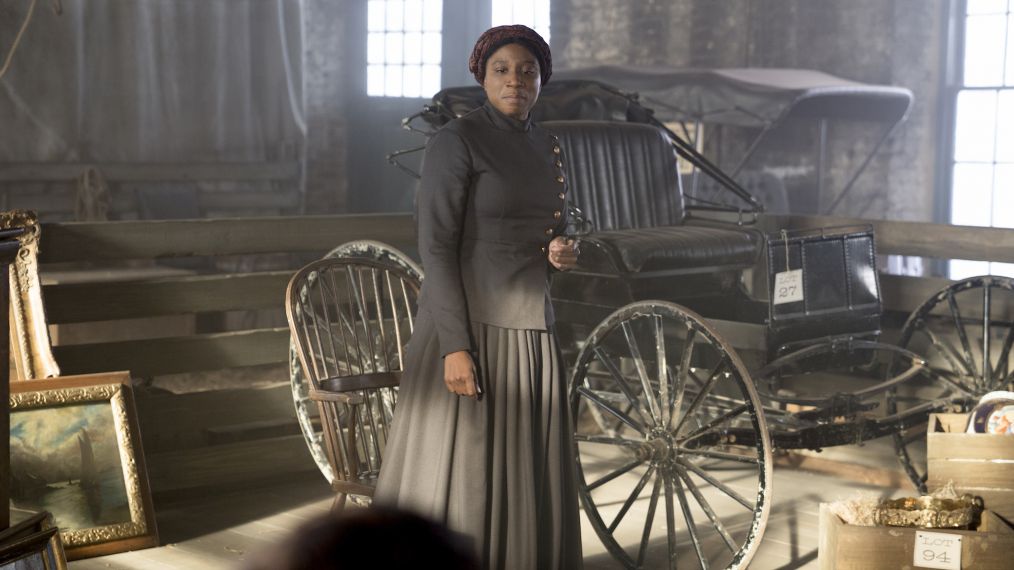
Spoiler Alert
Wednesday’s spellbinding Underground episode “Minty” was near-literally a one-woman show.
The entirety of the intensely moving hour featured Aisha Hinds’ Harriet Tubman delivering a powerhouse speech to fellow abolitionists as the movement is divided over whether or not to embrace John Brown’s militant ideas about ending slavery. Tubman— born Araminta “Minty” Ross—is firmly on the side of taking up arms, raging against those who call slavery God’s will and deeming it an act of war. “The more he said the word to me, the more sense it made,” she affirms.
“Minty” also handily served as Tubman’s Underground origin story, as she chronicled her life from her earliest days as a defiant child learning to fear white men while watching her mother (whose name she took when she bolted for freedom alone) grieve her enslaved children, to her first literal taste of freedom via a pilfered sugar cube, to the curious situation resulting in the head wound that induced her prophetic narcoleptic visions.
In Hinds’ capable hands, 45 pages of dialogue penned by Underground creators Misha Green and Joe Pokaski unspooled into a singular study in bravery and vulnerability, cause and conviction, and the power of one to impact the power of many. The best parts of “Minty” also served as a rallying cry for the Underground audience to rise up against political and societal wrongs that still plague the country and the world today. Staring into the camera in the episode’s closing moments—which, Hinds reveals also served as the second season’s last moments of production—Tubman offers a simple, eloquent call to action:
“If you don’t have it in you to take up arms against injustice, then you gotta pray another prayer and you gotta walk in with conviction. [God] will provide, but you gotta do your part. You gotta find what it means to you to be a soldier. Beat back those that are trying to kill everything good and right in the world and calling it ‘making it great again.’ We can’t afford to be just citizens in a time of war. That would be surrender.”
TV Insider talked with Hinds about pouring her heart and soul into the groundbreaking episode and her next project with Underground executive producer/director Anthony Hemingway.
When we spoke before the season aired, you talked of your reverence for your character and the work that you were about to undertake. Tell me about finding out about this particular episode and what you would be asked to do and what you would be giving the Underground audience.
Aisha Hinds: It was exciting! It was the culmination for me, I think, of all of the work that I’d ever done up until this point—this one character who sort of carried the spirit of everything that I had entered this business to do. It was a career moment, but also a moment for me as a human being to be called and positioned and elevated in the work in a way that I’d always desired, to do work that was purposeful and bigger than entertainment for me. I was like “Wow, this is Underground. This is what they do. They make revolutionary television.”
I was excited that they were bringing the medium of theater to the television screen, and then I realized that this was not a convention that they were manufacturing for television, but that they were actually honoring Harriet Tubman and telling her story in the way that she told her story.
How did you approach 45 pages of uninterrupted dialogue?
A couple of friends of mine were like, ‘Record yourself saying it.’ So I have voice recordings on my phone of me just saying the lines, which I fell asleep to and I woke up to. I would go from coffee shop to coffee shop, trying to keep my brain refreshed, because my brain would start to fade and become exhausted from absorbing all of the words. I was afraid that once I got it all in, I wouldn’t be able to get it all out. I was afraid they were all jumbled up in my head.
I got the script about two days before Thanksgiving break and production had shut down. So I came back to L.A. and I called a college friend of mine, and she flew from New Orleans to stay with me over break to help me run these lines over and over.
And then it was time to return to Savannah and talk the talk.
I woke up feeling like I was a superhero; I felt this burst of energy. As I go to the airport, I start to feel sick and I throw up on the plane. I land and I have a temperature. I’m burning hot. I go to sleep that night at the hotel and I drench the sheets with sweat. I wake up the next day and my cycle starts. It was literally blood, sweat, and tears all at the same time, because now I’m crying and I’m afraid.
Then they wanted to call me in for a second fitting, and so I asked them if I could do it on the actual day, because I’m not feeling well. Well, who told me to tell them I wasn’t feeling well! [Laughs] Because now the word had gone around production that Aisha’s not feeling well, and she’s the sole person on the call sheet and there is no backup plan. So I started lying. The next day they called, like, “How’s it going?” I was like, “I’m ready to rock and roll!” Because I didn’t want them to be afraid.
There’s no one who can take the credit besides Harriet. It wasn’t a teleprompter that helped me. It wasn’t an earpiece that helped me. It wasn’t an extensive rehearsal period that helped me. It wasn’t even my own craft that helped me, because I didn’t have time to be an actor. It was only to empty myself, to surrender to her story and allow her to inhabit me, allow her to consume me, and push her story out of my voice box. That is what happened.
When you opened your mouth and began to speak, what was the set like as that happened?
I tell you, the crew reached so deep down within and poured the last remnants of themselves into those last three days of production! None of us knew what we were getting into because none of us had done this thing ever before. Our crew had never shot 17 and three-fourths of a page in one day. I have to make sure that I keep every fourth of a page included because it was just that revolutionary! It had never been done, and it’s not even supposed to be possible. It not only elevated me as a person, but our entire crew. There were people who were in the industry for over 40 years who were like, “In all of my years in working in this industry, I have never, ever experienced a day like today.”
But it got done. And it is beautiful.
It got done! And it wasn’t lost on me that we were only afforded three days to do this. I think back to the scriptural stories, what happened in three days in the scriptures. All of it, to me, feels like a divine intervention and a divine visit, and I think it’s so important because Harriet’s spirit is so powerful. It never left us. I feel like her footprints are all over this earth, having led so many people to freedom—and her spirit is one we need today as we face odds that are akin to the divisive and systemic oppression that we read about in our history books that have taken on a modern-day articulation.
I think of how Harriet said, “My story ain’t over and it ain’t mine.” If Minty’s final moments aren’t evidence of that, I don’t know what is.
Yes! And this experience was not my own, either. Our entire crew experienced it. It was so funny, because I came back to L.A. and I felt like I couldn’t even talk to anybody who wasn’t there, because we were all still so full from the experience. For the first few days of coming home, I would only talk to Misha. We didn’t even have long conversations—we would just like stare at each other like, “I can’t believe that just happened. Did that just happen?”
It made me realize that I really was such a small part of that equation, and that this was really an experience that was meant for all of us to experience. As we present it to audience, I think it’s something that will make everyone feel like they’re experiencing it in their own individual way. Harriet’s story is really jumping into the hearts and souls of people.
Jessica De Gouw [Elizabeth] was with you in the episode, but were any of your costars who weren’t a part of it there to watch you perform it?
Jurnee Smollett-Bell [Rosalee] had gone, because at that point now she was pushing it, she might’ve had that baby, and we were too happy to send her home immediately. But Amirah Vann [Ernestine] was wrapping, and she did come in. People were like, “Amirah, why are you staying?” Because everyone at that point was so ready to go home. It was so wonderful. She came to me and she said, “I wanted to watch you, sis.” That has been the spirit of this group, this collective. We all understand what an honor it is for any of us to tell any part of the story. Amirah’s character was one of those characters that endeared me to the show when I first started to watch it. To turn around and have her standing in support of this experience was so beautiful.
Jess would see me struggling through certain passages, and just her gaze and her energy—she was so supportive and always present. To sit on the other side of that, on these long days of production, she was just so beautifully supportive.
[Underground producer/director] Anthony Hemingway is the love of my life. He creates an atmosphere that truly makes it a warm environment to work in, and he is so humble. He takes on any role necessary to push forth the narrative. He will bring me water; he will bring me tea; he will fuss with my hair. It blew my mind how he was there for me emotionally, artistically, technically; but then he was also there for his entire crew.
RELATED: Subscribe to TV Insider’s Underground Newsletter
And Misha! Oh my God! I got back to Savannah and I’m learning the lines and she stops by to give me a little doll. She pushes it in my hand and she said that she used it for her inspiration, because it was a doll that she had growing up as a child and whatever stories her imagination would create. She was like, “This is on loan to you.” So I sat that doll in my hotel room, and I would bring it to my trailer, and it was so beautiful because it was this little, small, black doll [that] reminded me of the importance of this story reaching this new generation—little girls, little Harriets in the world today that are waiting to rise up.
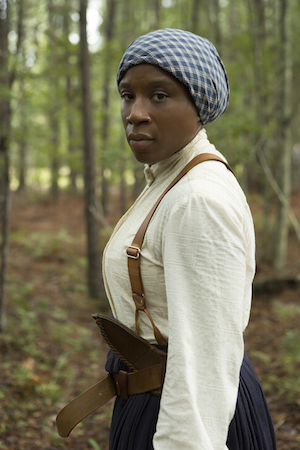
Aisha Hinds as Harriet Tubman
And when you were done, when “Minty” was in the can, what were you feeling?
The feeling at the end was like the feeling at the beginning, when I first heard about being cast as Harriet Tubman, and that it was real and that the deals were closed and it was actually happening. I literally wept.
I make this distinction between crying and weeping, because I feel like crying is a response to anguish, and weeping is more a feeling that something inside of you breaks open and these tears begin to flow out as a way of emptying yourself.
I felt like the beginning was an emptying so that Harriet Tubman could inhabit me and consume me. At the end of that last night, that breaking thing happened again and I wept again. I wept all that was left inside of me, and I was emptied again. I felt like she had filled me up with her, and in telling the story, pieces of her were seeping out of me and seeping out of me and seeping out of me. That last weeping, I felt was the final emptying, and then I just felt a tremendous overwhelming sense of gratitude to her. Such a gratitude!
I can tell by talking with you that you are always going to carry this with you, not just as a career experience, but also as a life experience. But you are still a young woman and you are a sought-after actress, so I have to ask—how is this going to impact how you feel about the next roles offered you?
That is the fear! [Laughs] Right afterward, I spoke to Anthony Hemingway and he was shooting a pilot for USA Network [the upcoming Unsolved, about the murders of rappers Tupac Shakur and Biggie Smalls]. He asked me to do a role, but mind you, after I had done “Minty,” I was like, “Oh my God, I can’t do anything. What could I really do after Harriet Tubman?”
I couldn’t come up with anything, and I was fine at the time, because I was so nostalgic and emotional about it. So I was like, listen, if this is it, this is it. But like I said, I love Anthony so much, and he’s so gifted and beautiful and we have this thing where I would say to him, “Listen, where you go, I go.”
So he brought this opportunity to play Voletta Wallace, who is the mother of Biggie Smalls, and I was like, this makes all the sense in the world. They are from Brooklyn, which is where I am from. I grew up listening to Biggie’s music. His mother is a West Indian woman from Jamaica, and my parents are also West Indian and moved to America. There were so many cultural parallels, and it continued the conversation of examining justice and what that looks like and what legacy looks like between mothers and sons.
Playing that mother was a sensible thing for me to move into, but I tell you, when the day came for me to shoot, like I was so deeply in my own way! [Laughs] It felt that way because I was walking on set hoping to experience this kumbaya moment, this spiritual-awakening moment, where now I’m expecting every role to be like an opening up of the heavens where spirits descend upon me. I’m like, where is it? I think there’ll be quite a bit of that for the next few projects. But I’m happy for this moment and for this work to spark the next few conversations!
Underground, Wednesdays, 9/8c, WGN America

